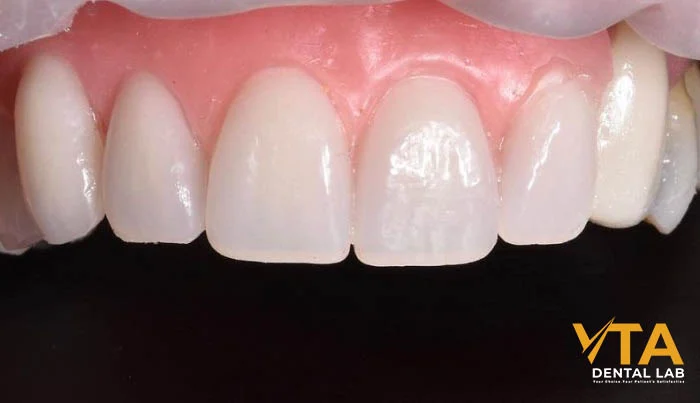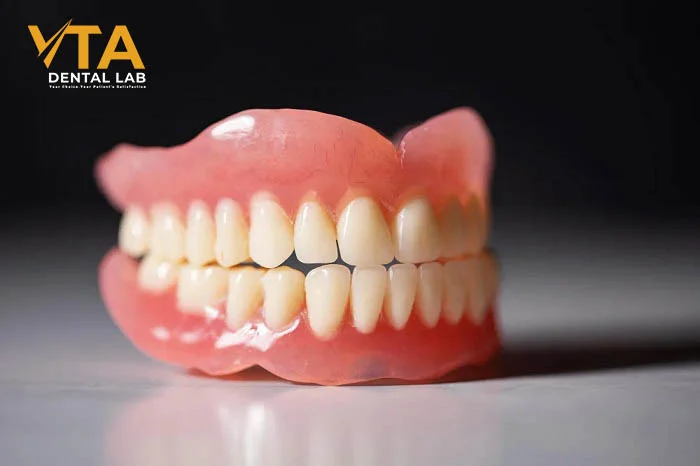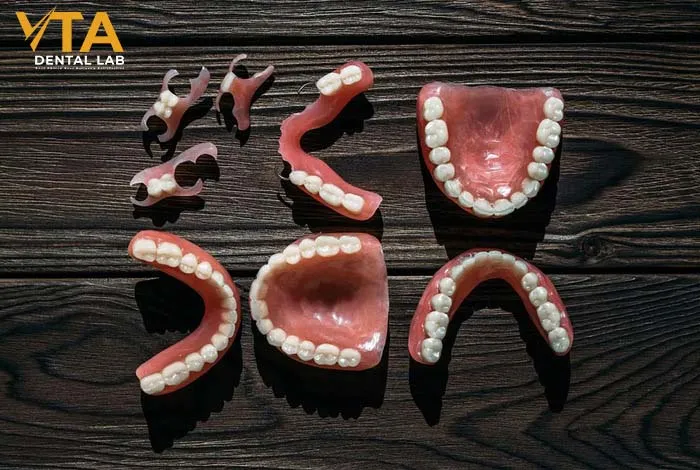Porcelain Denture vs Acrylic Denture Teeth: Which Tops
Porcelain dentures have long been regarded as a popular option for individuals seeking a more natural-looking solution for tooth replacement. To make the best decision for your patient’s oral health, it’s essential to explore the characteristics, properties, and potential alternative materials. By understanding the key factors to consider, you’ll be equipped to choose the option that leaves your patients smiling with confidence.
How Are Porcelain Used in Dentistry?
Porcelain is utilized in various dental procedures, including producing full and partial dentures. It is an inorganic material highly valued for its smooth texture and slightly translucent appearance, which makes porcelain teeth a popular choice for crafting prosthetics.

Side-by-side comparison of porcelain denture vs acrylic denture teeth materials
In addition to dentures, the restorative industry employs porcelain in the fabrication of:
Porcelain crowns: Porcelain is a common material for crowns, which can be made all-porcelain or as porcelain-fused-to-metal (PFM) crowns. PFM crowns feature an outer porcelain layer fused to a small metal core that covers the natural tooth.
Veneers: Porcelain is used to create veneers, which are thin, natural-looking layers in a white tooth shade typically bonded to the front surfaces of anterior teeth.
Bridges: Dental bridges replace missing teeth and are often made from porcelain or metal. However, porcelain bridges are more frequently chosen for their superior aesthetics.
Inlay/Onlay: Porcelain is used in inlay/onlay restorations. An inlay fits inside the cusps of the tooth, while an onlay extends over one or more cusps. They are used to fill cavities and restore a tooth’s function while maintaining its natural structure.
The Benefits Of a Porcelain Denture
Despite advancements in dental materials like nylon, resin, and acrylic, porcelain has remained the gold standard for producing dentures for decades. This is because it offers the following benefits:
High biocompatibility: Patients who choose porcelain dentures do not have to worry about introducing foreign materials into the mouth that might cause allergic reactions or infections. Porcelain is highly regarded for its safety and health benefits.
Durability and Longevity: Porcelain is a hard and sturdy material capable of withstanding high pressures during chewing, brushing, or coming into contact with other teeth.
Aesthetic Appeal: A porcelain denture closely mimics the appearance of natural teeth. With a slightly translucent look that reflects light rather than absorbing it, porcelain creates a realistic appearance similar to natural teeth.
Temperature resistance: For patients who are sensitive to temperature changes in their mouths, a porcelain denture can help reduce these symptoms. The material’s resistance to temperature fluctuations makes it a practical choice for comfort.

Full upper and lower porcelain dentures placed on a dental model for demonstration
The Drawbacks of Porcelain Denture
While a porcelain denture offers many notable advantages, they are becoming less popular due to certain health-related risks, as detailed below:
Impact on the jawbone: During chewing, porcelain exerts significant pressure on the jawbone. Over time, this can contribute to bone loss in the affected areas.
Damage to Adjacent Teeth: Porcelain’s durability can be a double-edged sword. Its hardness increases the risk of damaging neighboring teeth during chewing or grinding.
Attachment Issues: A porcelain denture must be mechanically attached to the denture base, typically using small holes or pegs on the back of each tooth to secure the connection. However, this mechanical bond is not very strong, making porcelain teeth more prone to breaking or detaching from the denture base.

Close-up of porcelain denture teeth showing natural translucency and shine
The Increasing Popularity of Acrylic Denture Teeth
A porcelain denture is no longer as prevalent as it once was, thanks to the growing prominence of acrylic dentures and advancements in manufacturing technology. Acrylic can achieve a similar appearance to porcelain without causing jaw strain, bone loss, or damage to remaining teeth.
However, dentures made from acrylic also have their limitations. Acrylic is much softer and less durable than porcelain, which means acrylic dentures are more prone to wear over time. Despite this, they are less likely to crack or break compared to porcelain dentures.

Acrylic denture teeth set designed for full dentures with gum-coloured base
Additionally, since acrylic dentures are not as hard and smooth as hard and smooth as porcelain, they require meticulous and frequent cleaning to prevent bacterial growth.
Fortunately, newer materials, such as zirconia, offer impressive durability and address many of the drawbacks of both porcelain and acrylic dentures. This makes them an increasingly popular option for denture fabrication.
VTA Dental Lab: Where Digital Dentistry Meets Traditional Craftsmanship
At VTA Dental Lab, we lead the way in the digital revolution, modernizing dental lab processes from start to finish. When you partner with VTA, your dental practice gains access to a wide range of benefits, whether you are working with digital cases or physical ones. Our lab ensures seamless compatibility with all major scanners, providing unparalleled flexibility.
Contact VTA Dental Lab today to experience our full service!